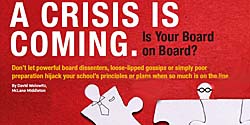


Going to School on Crisis Management
[By Howard Fencl, Hennes Communications]
David Wolowitz is a brilliant attorney who advises independent schools all over the world on every prickly nuance of crisis management and risk avoidance. He recently penned “A Crisis is Coming. Is Your Board on Board?” that offered seven steps independent schools should take to plan for, and deal with, crisis or controversial issues.
But David’s advice is a valuable lesson for anyone for any organization coping with a crisis. We’ve been lucky enough to work with him on a couple of occasions: His main takeaways sync with our mantra for clients:
- Create a crisis communications plan (or update your old one)
You probably have an operations plan in the can so your business can continue its work in a crisis. But you need a communications plan as well so that your board and leadership team know and understand their roles, who says what to whom – and when they should say it – when it hits the fan.
- Test the plan and evaluate your performance
Run your crisis response team through a tabletop exercise simulating an ugly scenario that keeps your leadership team awake at night. Revise and improve your crisis communications plan based on the group’s performance under (simulated) fire.
To this, we’d add that media training is an important strategic tool in prepping for the real deal: You need spokespeople communicating consistent messages to all of your internal stakeholders and on conventional and social media platforms.
If the possibility of workplace crises such as criminal and sexual misconduct, financial malfeasance, data breach or environmental health and safety violations, give you the night terrors, read David’s piece – then why don’t we talk?